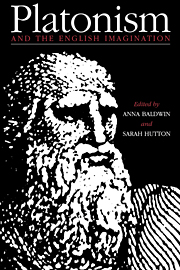Book contents
- Frontmatter
- Contents
- Notes on contributors
- Preface
- I ANTIQUITY
- II THE EARLY CHRISTIAN PERIOD AND THE MIDDLE AGES
- III THE RENAISSANCE AND THE SEVENTEENTH CENTURY
- IV THE EIGHTEENTH CENTURY
- V THE NINETEENTH CENTURY
- VI THE TWENTIETH CENTURY
- 24 Introduction
- 25 Yeats and Platonism
- 26 Virginia Woolf and Plato: the Platonic background of Jacob's Room
- 27 Plato and Eliot's earlier verse
- 28 The Cantos of Ezra Pound: ‘to build light’
- 29 Platonism in Auden
- 30 Platonism in Iris Murdoch
- Bibliography
- Index
25 - Yeats and Platonism
Published online by Cambridge University Press: 15 December 2009
- Frontmatter
- Contents
- Notes on contributors
- Preface
- I ANTIQUITY
- II THE EARLY CHRISTIAN PERIOD AND THE MIDDLE AGES
- III THE RENAISSANCE AND THE SEVENTEENTH CENTURY
- IV THE EIGHTEENTH CENTURY
- V THE NINETEENTH CENTURY
- VI THE TWENTIETH CENTURY
- 24 Introduction
- 25 Yeats and Platonism
- 26 Virginia Woolf and Plato: the Platonic background of Jacob's Room
- 27 Plato and Eliot's earlier verse
- 28 The Cantos of Ezra Pound: ‘to build light’
- 29 Platonism in Auden
- 30 Platonism in Iris Murdoch
- Bibliography
- Index
Summary
While Yeats refuses to be categorised, it is clear that Platonism is the philosophical tradition with which he is most closely aligned; as Robertson Davies has said, reviewing a book on Yeats and Jung, ‘If we do not agree that Yeats and Jung are wholly Platonists, we must agree that they fit better into that honorable assembly than any others’. For Platonism provided Yeats with three key doctrines in which he himself believed: a transcendent reality, the immortality of the soul, and reincarnation. And while Yeats is the sort of Platonist who strongly endorses the material world, his theism is simultaneously a means of countering reductive empiricism, of which he sees Locke as the archetypal exponent. So in his philosophical correspondence with T. Sturge Moore, Yeats asserts in May 1926 that, ‘the three provincial centuries’ of reductive, mechanical thought engineered by Locke and others have come to an end and that our task now is to ‘deduce all from the premises known to Plato’.
Yeats was attracted to Platonism from the beginning, for while still at school he ‘stood with Plato and with Socrates’. But Yeats came to Platonism, as it were, backwards, beginning with late-nineteenth century versions, proceeding to the Cambridge Platonists (see Scott, pp. 139–50 above) about 1914,and reaching Plato and Plotinus, pure and unadulterated, only in the last two decades of his life, the 1920s and 30s. So in Yeats's early life Platonism presented itself to him through curious channels such as the theosophy of Madame Blavatsky, which was so thoroughly syncretistic that, by definition,it had to contain a good deal of popular Platonism, and the Order of the Golden Dawn, which can be viewed as an extremely late revival of Renaissance Platonism.
- Type
- Chapter
- Information
- Platonism and the English Imagination , pp. 279 - 289Publisher: Cambridge University PressPrint publication year: 1994
- 1
- Cited by



